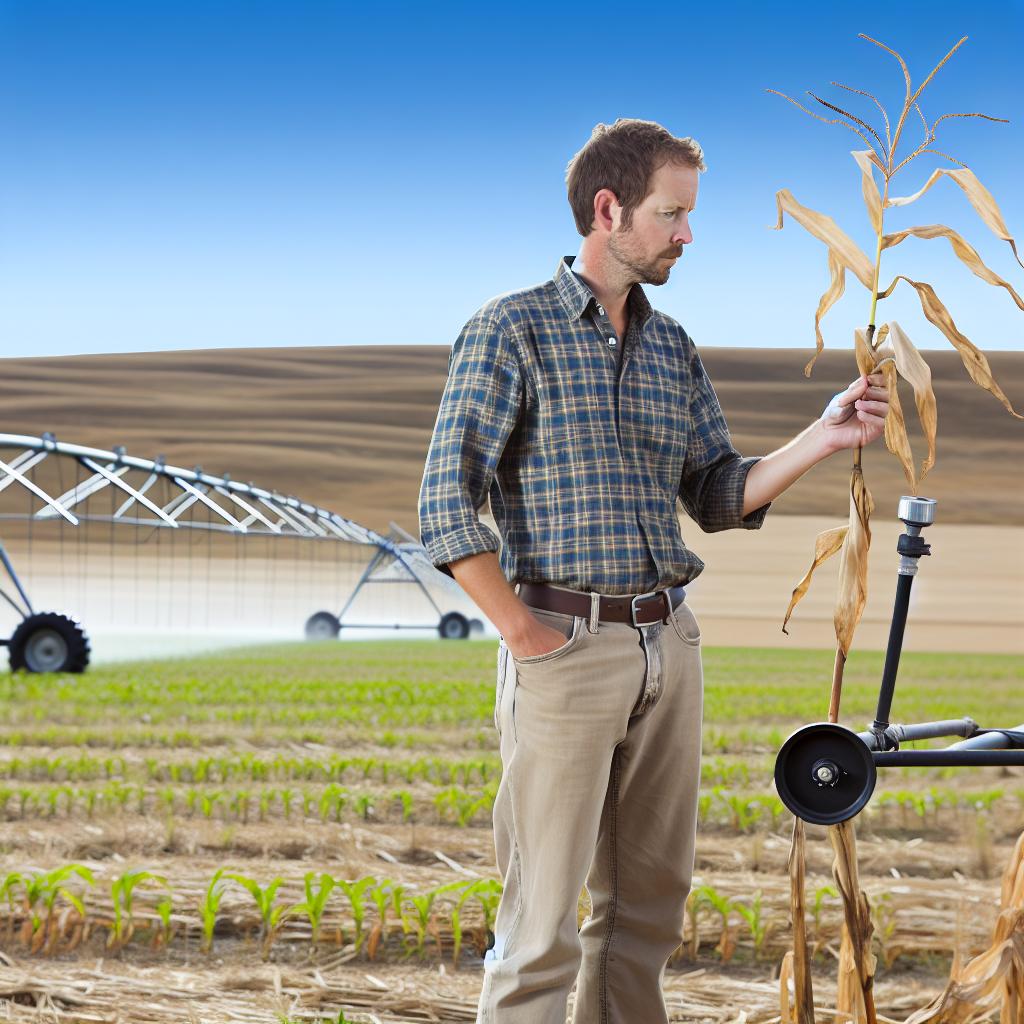Introduction to Rural Development Policies and Their Impact on Farming
Defining Rural Development Policies
Rural development policies aim to improve the living standards in rural areas.
They focus on enhancing agricultural productivity and rural economies.
Moreover, these policies strive to foster sustainable practices and infrastructure.
The Importance of Farming in Rural Development
Agriculture plays a vital role in rural economies.
It supports local employment and food security.
Additionally, farming contributes to the overall growth of rural communities.
Impact on Agricultural Productivity
Effective rural development policies boost agricultural productivity significantly.
They provide farmers with access to resources and technology.
Consequently, farmers can adopt better farming techniques and increase yields.
Support for Smallholder Farmers
Smallholder farmers are crucial to rural economies.
These policies often include initiatives that support small-scale farming.
They provide training, microloans, and access to markets.
Such support helps smallholder farmers thrive and contribute to food systems.
Encouraging Sustainable Practices
Rural development policies promote sustainable agricultural practices.
These practices help maintain soil health and conserve water resources.
Transform Your Agribusiness
Unlock your farm's potential with expert advice tailored to your needs. Get actionable steps that drive real results.
Get StartedFurthermore, they reduce the environmental impact of farming.
Building Infrastructure for Success
Infrastructure development is essential for effective rural policies.
Improved roads enhance market access for farmers.
Furthermore, reliable electricity and water supply boost agricultural productivity.
Investment in technology also transforms rural farming practices.
Engaging Local Communities
Community engagement is crucial in the development of rural policies.
Involving local farmers ensures policies meet their needs effectively.
Moreover, engaged communities can advocate for necessary changes and improvements.
Implications for Future Agricultural Development
Ultimately, rural development policies present numerous benefits for farming.
They empower farmers and improve the overall rural economy.
These policies are fundamental to maximizing farm potential.
Assessing the Current State of Rural Development in Agricultural Regions
Overview of Current Rural Development Efforts
Rural development policies aim to enhance agricultural productivity.
These policies focus on improving living standards in rural communities.
Local governments implement various programs to stimulate growth.
Funding from national sources supports many rural initiatives.
However, challenges persist in reaching intended outcomes.
Challenges Facing Rural Development
Access to resources remains a significant issue in many areas.
Poor infrastructure limits connectivity for farmers and businesses.
Additionally, education and training opportunities are often lacking.
The aging population exacerbates labor shortages in agriculture.
Furthermore, climate change impacts agricultural sustainability.
Success Stories in Rural Development
Some regions have successfully revitalized their agricultural sectors.
Innovative practices have increased crop yields in these areas.
Community-driven projects have fostered collaboration among locals.
Showcase Your Farming Business
Publish your professional farming services profile on our blog for a one-time fee of $200 and reach a dedicated audience of farmers and agribusiness owners.
Publish Your ProfilePublic-private partnerships have also proved beneficial.
Moreover, technology adoption enhances efficiency and production.
The Role of Stakeholders in Rural Development
Farmers play a crucial role in implementing development strategies.
Local businesses support rural economies through job creation.
Governments provide essential resources and funding for projects.
NGOs often facilitate training and education programs.
Lastly, researchers contribute valuable insights into best practices.
Future Directions for Rural Development
Integrating sustainability into rural development is vital.
Policies should prioritize environmental conservation alongside productivity.
Investments in new technology can revolutionize agricultural practices.
Additionally, strengthening community engagement will enhance outcomes.
Finally, promoting local food systems can increase resilience.
Key Elements of Effective Rural Development Policies
Community Engagement
Active participation of local communities drives better policy outcomes.
Engaging residents fosters trust and collaboration among stakeholders.
Moreover, community input shapes relevant and effective initiatives.
Investment in Infrastructure
Robust infrastructure is crucial for rural development success.
Investing in roads and transportation networks enhances accessibility.
This investment directly impacts agricultural productivity and market access.
Education and Training Programs
Providing training equips farmers with modern agricultural practices.
Education initiatives improve literacy rates and knowledge application.
Consequently, informed farmers can adopt sustainable methods efficiently.
Workshops and Seminars
Organizing workshops engages the community in active learning.
These sessions allow participants to exchange innovative ideas.
Furthermore, they build networks among local farmers and experts.
Financial Support and Resources
Access to financial resources empowers farmers to invest in their operations.
Microloans and grants can support the establishment of new ventures.
This financial backing helps mitigate risks associated with agriculture.
Partnerships with Financial Institutions
Collaborating with banks creates tailored financing solutions.
These partnerships can lower barriers to accessing funds.
Moreover, they facilitate financial literacy programs for farmers.
Policy Frameworks and Regulation
Effective policies provide a clear structure for agricultural practices.
Regulations ensure the sustainability of farming within rural areas.
Additionally, policy frameworks encourage investment in technology.
Monitoring and Evaluation Strategies
Regularly assessing policy effectiveness is essential for improvements.
Data-driven evaluations inform adjustments to various initiatives.
Overall, continuous monitoring enhances policy credibility and effectiveness.
Learn More: Integrating Food Safety Standards into Farm Operations
The Role of Technology in Enhancing Farm Productivity
Introduction to Technological Advancements
Technology has revolutionized farming practices globally.
It enhances efficiency, productivity, and sustainability on farms.
Farmers today can leverage advanced tools for better results.
Showcase Your Farming Business
Publish your professional farming services profile on our blog for a one-time fee of $200 and reach a dedicated audience of farmers and agribusiness owners.
Publish Your ProfileEmbracing technology is crucial for modern agricultural success.
Precision Agriculture
Precision agriculture utilizes data analysis for better decision-making.
This approach ensures resources are allocated efficiently.
Farmers can monitor crop health using satellite technology.
Additionally, drones provide real-time aerial surveillance of fields.
As a result, yield predictions become more accurate and reliable.
Automation and Robotics
Automation is changing traditional farming operations significantly.
Robotic systems can perform tasks like planting and harvesting.
These technologies reduce labor costs and increase efficiency.
Moreover, they minimize human error, leading to higher yields.
Farmers can focus on strategy rather than repetitive tasks.
Sustainable Farming Practices
Technology supports sustainable farming practices effectively.
Smart irrigation systems conserve water and improve efficiency.
Soil sensors help monitor nutrient levels precisely.
This data allows farmers to apply fertilizers accurately.
Consequently, environmental impact reduces significantly.
Access to Information and Resources
Today’s farmers have unprecedented access to information.
Online platforms provide education on best practices and innovations.
Farm management software streamlines operations and planning.
These resources help farmers make informed decisions quickly.
Furthermore, technological connectivity fosters community support among farmers.
Implications for Future Farming
Emphasizing effective rural development policies is essential.
Farming using modern technology can significantly maximize potential.
As technology continues to evolve, so will agricultural capabilities.
Farmers must embrace these changes for future prosperity.
Uncover the Details: Climate Laws and Their Effects on Farming Operations
Case Studies: Successful Rural Development Initiatives and Their Outcomes
Introducing Community Supported Agriculture
Community Supported Agriculture (CSA) fosters direct connections between farmers and consumers.
This initiative enhances local food production while supporting farm viability.
For example, Greener Pastures CSA in Ohio connects 100 families to fresh produce each season.
This model improves income stability and reduces food miles.
Promoting Renewable Energy Projects
Rural areas can benefit from renewable energy initiatives.
These projects create jobs and diversify income sources for farms.
The Sunflower Energy Cooperative in Kansas exemplifies this approach.
It provides solar panels to local farmers, reducing electricity costs significantly.
This investment enhances sustainability and promotes energy independence.
Investing in Rural Infrastructure
Improved infrastructure plays a vital role in rural development.
Investing in roads and connectivity can boost local economies.
A notable example is the Rural Road Access Initiative in Kentucky.
This program upgraded over 200 miles of rural roads.
The enhancements improved access to markets and healthcare services.
Showcase Your Farming Business
Publish your professional farming services profile on our blog for a one-time fee of $200 and reach a dedicated audience of farmers and agribusiness owners.
Publish Your ProfileSupporting Young Farmers through Education
Educational initiatives can empower the next generation of farmers.
The Young Farmers Coalition offers resources and training for budding farmers.
In Idaho, their workshops have led to an increase in organic farming practices.
This shift promotes sustainable practices and increases farm profitability.
Harnessing Technology for Farm Management
Technology integration enhances farm productivity and efficiency.
Precision agriculture provides farmers with data for informed decision-making.
AgriTech Solutions in California offers innovative tools for crop management.
Their technologies lead to reduced costs and increased yields for farmers.
Fostering Local Market Development
Local market initiatives bolster the rural economy.
Farmers’ markets allow producers to sell directly to consumers.
The Riverside Farmers’ Market in Wisconsin connects over 50 local vendors to the community.
This initiative boosts local sales and creates a sense of community.
See Related Content: Legal Implications Of Pesticide Misuse In Farming

Strategies for Engaging Farmers in Policy Development
Building Relationships
Establishing trust is critical for effective policy engagement.
Farmers value relationships with policymakers.
Regular meetings foster open communication.
Implementing a feedback loop ensures farmers feel heard.
Utilizing Technology
Technology can bridge gaps between farmers and policymakers.
Online platforms allow for interactive dialogue.
Mobile applications can facilitate feedback collection.
Data analytics can help identify trends and needs.
Promoting Education and Awareness
Educational workshops can demystify policy processes.
Farmers should understand how policies impact them directly.
Awareness campaigns can highlight successful case studies.
Collaboration with local universities can enhance education efforts.
Involving Farmers in the Decision-Making Process
Encouraging participation leads to more relevant policies.
Establish advisory panels consisting of diverse farmer representatives.
Policy simulations can engage farmers in real-world scenarios.
Such involvement leads to greater acceptance of policies.
Leveraging Local Organizations
Local farming organizations play a vital role in engagement.
They often have established networks and credibility.
Partnerships with these organizations enhance outreach.
Co-hosting events can unify efforts in policy advocacy.
Continuous Feedback and Adaptation
Monitoring and evaluation are crucial for policy success.
Regular assessments can identify gaps in implementation.
Farmers’ feedback should inform adjustments over time.
Adaptability ensures policies remain relevant and effective.
Discover More: Funding Opportunities Through Conservation Programs
Balancing Economic Growth and Environmental Sustainability in Rural Policies
Importance of Economic Growth
Economic growth is vital for rural development.
It creates jobs and boosts local economies.
Showcase Your Farming Business
Publish your professional farming services profile on our blog for a one-time fee of $200 and reach a dedicated audience of farmers and agribusiness owners.
Publish Your ProfileMoreover, it leads to improved living standards for residents.
Investing in infrastructure accelerates growth opportunities.
For instance, better roads enhance accessibility for farmers.
This, in turn, increases market access for their products.
Strategies for Promoting Growth
Implementing effective policies can promote growth effectively.
Governments can support local businesses through grants and loans.
In addition, creating incentives for investment fosters economic activity.
Adopting new technologies also enhances productivity in agriculture.
Farmers benefit from training programs focused on modern techniques.
Significance of Environmental Sustainability
Environmental sustainability is equally crucial in rural policies.
It ensures the preservation of natural resources for future generations.
Healthy ecosystems support agricultural productivity and community well-being.
Sustainability practices can reduce the carbon footprint of farming.
This is essential in the face of climate change challenges.
Integrating Economic Growth with Sustainability
Policies must integrate economic growth with sustainability goals.
Public initiatives should focus on eco-friendly practices.
For example, supporting organic farming can enhance soil health while generating income.
Rural development plans could also promote local food systems.
This approach increases self-sufficiency and reduces transportation emissions.
Community Involvement and Education
Engaging local communities is key to successful rural development.
Awareness programs educate residents on sustainable practices.
Furthermore, community-led initiatives can enhance local resilience.
Collaboration between local governments and citizens fosters trust.
This partnership ensures policies reflect community needs and priorities.
Recommendations for Policymakers
Policymakers should adopt a holistic approach to rural development.
Encouraging sustainable agricultural practices is essential.
Investment in renewable energy sources can reduce dependency on fossil fuels.
Additionally, creating environmentally friendly incentives can drive change.
Monitoring and evaluation of policies ensure their effectiveness over time.
Future Trends in Rural Development and Their Potential Effects on Farming
Technological Innovations
New technologies are revolutionizing farming practices.
Farmers increasingly use precision agriculture.
This approach optimizes resources, reducing waste.
Moreover, advancements in drone technology provide real-time data.
Drones can monitor crop health and growth patterns efficiently.
Government Policies
Upcoming government policies will shape rural development significantly.
Increased funding for sustainable practices is on the horizon.
Such initiatives aim to enhance soil health and water conservation.
Additionally, policies promoting rural infrastructure improvements are critical.
Better roads and communication systems will facilitate market access.
Climate Change Awareness
Farmers must adapt to the impacts of climate change.
Showcase Your Farming Business
Publish your professional farming services profile on our blog for a one-time fee of $200 and reach a dedicated audience of farmers and agribusiness owners.
Publish Your ProfileFuture rural development will emphasize resilience strategies.
Crop diversification helps mitigate risks associated with climate variability.
Furthermore, community education on sustainable practices is essential.
Agriculture is a vital player in addressing climate issues.
Market Trends
Consumer demand for organic and local produce is rising.
Farmers are exploring new marketing strategies to meet this demand.
Participating in farmers’ markets can enhance visibility and sales.
Collaborations with local businesses can strengthen community ties.
This trend fosters loyalty and supports the local economy.
Collaborative Farming Models
Cooperative farming models are gaining traction.
Farmers benefit from shared resources and knowledge.
Collaboration also reduces individual financial burdens.
Joint ventures can lead to innovative approaches to sustainability.
This unity fosters a supportive agricultural community.
Additional Resources
USDA Science and Research Strategy, 2023-2026: Cultivating …




